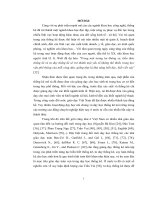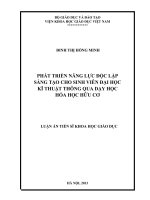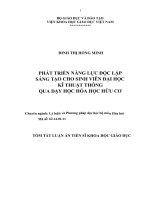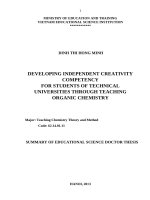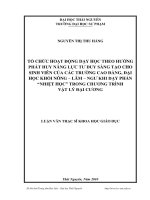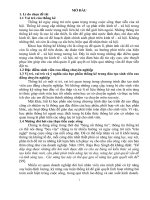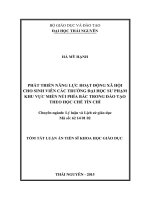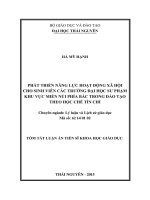Phát triển năng lực dạy học tích hợp cho sinh viên đại học sư phạm kỹ thuật trong dạy học nghiệp vụ sư phạm theo tiếp cận mô đun tt tiếng anh
Bạn đang xem bản rút gọn của tài liệu. Xem và tải ngay bản đầy đủ của tài liệu tại đây (689.94 KB, 27 trang )
MINISTRY OF EDUCATION AND TRAINING
HANOI NATIONAL UNIVERSITY OF EDUCATION
NGO THI NHUNG
DEVELOPING MODULE - BASED INTEGRATED
TEACHING COMPETENCY FOR TECHNICAL
EDUCATION STUDENTS
IN PEDAGOGICAL SKILLS TEACHING
Major: Theory and history of education
Code: 9.14.01.02
SUMMARY OF DOCTORAL THESIS IN EDUCATION
HANOI - 2019
The work was completed at:
HANOI NATIONAL UNIVERSITY OF EDUCATION
Scientific instructor: 1. Assoc. Prof. Dr. Tran Thi Tuyet Oanh
2. Dr. Ta Quang Tuan
Reviewer 1: Prof.Dr. Phan Van Kha
Reviewer 2: Assoc. Prof. Dr Tran Huu Hoan
Reviewer 3: Assoc. Prof. Dr Le Huy Hoang
The dissertation will be defended before the meeting
of the School-level thesis council at Hanoi University of Education
at the time ... .. hour ... day ... month ... year ...
The thesis can be found at the library:
- National Library of Vietnam (Hanoi)
- Library of Hanoi National University of Education
1
INTRODUCTION
1. Rationale
It is clearly stated in the Resolution 29/NQ-TW on fundamental and
comprehensive innovation in education: “The content of vocational education
(VE) is developed in the direction of integration between knowledge, skills and
professional working style to form occupational competencies for
learners". Also, the Resolution 29/NQ-TW raised the task of "Standardizing the
teaching staff at each education and training level" and pointed out the
"Innovation of training curriculum to develop competency and quality for
learners ”.
Integrated teaching between theory and practice is a modern teaching
method and is a trend being applied in many developed countries. Through
integrated teaching, "Learners’ competency to effectively solve problems in the
real life as well as real work are developed", forming the integrated competency
of the jobs’ tasks to work effectively with certain quality.
Nowadays, module-based teaching has also been a training trend in many
countries around the world which facilitates learners in studying what they
need, lifelong learning without repetition of what they have learned. In our
country, the module-based vocational education system has been conducted in
order to train competence-based workers and technicians (skilled workers) be
able to work skillfully, meeting the requirements of real production.
Universities of Technology Education are responsible for training the
future teaching staff for vocational education system. At present, some
universities of technology education have made a movement from content-based
to competency-based training. However, there are still many difficulties in the
application due to the lack of strong theoretical basis for using integrated and
module-based teaching for orientation, moreover, the pedagogical skills teaching
at universities of technology education has not been developed in integrated
module-based approach, the training process is not based on the necessary
competencies that vocational education teachers should have, as a result, the
training products of the universities of technology education have not yet met the
requirements of the vocational education system.
From the above reasons, the author has chosen the topic "Developing
module - based integrated teaching competency for technical education
students in pedagogical skills teaching" for the PhD thesis with the desire to
make contribution to the improvement of training quality universities of
technology education to meet new requirements.
2
2. Research objectives
The theoretical background and situation of developing integrated
teaching competency in module - based pedagogical skills teaching is studied,
then measures to develop module - based integrated teaching competency in
pedagogical skills teaching for students at universities of technology education
is proposed, contributing to the improvement of teachers training quality for
vocational education system.
3. Object and subject of the research
3.1. Subject of the research
It is the process of pedagogical skills teaching at universities of
technology education.
3.2. Object of the research
It is the developing of module - based integrated teaching competency in
pedagogical skills teaching for students at universities of technology education.
4. Research hypothesis
Integrated teaching competency of vocational education teachers includes
many different competencies. If the elements of integrated teaching competency
necessary to develop pedagogical skills teaching for students at universities of
technology education and organizing teaching activities according to modulebased approach are clearly determined, then integrated teaching competency for
students will develop, contributing to a better quality of training vocational
education teachers at universities of technology education.
5. Tasks of the research
- Develope a theoretical basis for developing module - based integrated
teaching competency in pedagogical skills teaching for students at universities
of technology education.
- Examine, assess the status of developing module - based integrated
teaching competency in pedagogical skills teaching for students at universities
of technology education.
- Propose and experiment measures to develop module - based integrated
teaching competency in pedagogical skills teaching for students at universities
of technology education.
6. Scope of the research
- The thesis focuses on develop module - based integrated teaching
competency in pedagogical skills teaching for formal technical education
students at universities of technology education under the Ministry of Labor,
Invalids and Social Affairs.
3
- The thesis conducts a survey on the situation of developing module based integrated teaching competency in pedagogical skills teaching for
students at 3 universities of technology education: Nam Dinh University of
Technology Education, Vinh University of Technology Education, Vinh Long
University of Technology Education.
- The thesis’s experiment is at Nam Dinh University of Technology
Education.
7. Methodology and research methods
7.1.Approach methods: The thesis research is based on activity-based
approach, competency- based approach, module - based approach and historical
- logical approach.
7.2. Research methods
- Theoretical research methods group: analysis, synthesis, comparison.
- Practical research methods group: investigation, interview, observation,
product studying, pedagogical experiment.
- Processing information methods: Mathematical statistics, Excel and
SPSS 20.0 software for Window.
8. Defended points
- To develop integrated teaching competency for students at universities
of technology education, it is necessary to determine the integrated teaching
competency framework of technical education students, design the pedagogical
skills curriculum into modules and organize pedagogical skills teaching for
students following the module -based approach.
- Organize the job analysis of teachers in vocational education will
determine the integrated teaching competency framework for technical
education students at universities of technology education
- Simultaneously implementing 5 measures proposed by the thesis, it will
be possible for the developing module - based integrated teaching competency
in pedagogical skills teaching for students at universities of technology
education to be effective.
9. New contributions of the thesis
Theoretically:
- Better and deeper clarification of some terms related to the topic that
have currently been seen by various views such as: Competency and teaching
competency; integrated teaching and integrated teaching competency;
developing integrated teaching competency, module and module - based
teaching.
4
- Forming theoretical basis to develop module - based integrated teaching
competency in pedagogical skills teaching for students at universities of
technology education; The integrated teaching competency framework for
students at universities of technology education.
Practically:
- Assessing the current situation about integrated teaching competency of
students at universities of technology education and the current situation of
developing integrated teaching competency in module - based pedagogical
skills teaching for students at universities of technology education, pointing out
the limitations and causes of the situation.
- Proposing 5 measures to develop module - based integrated teaching
competency in pedagogical skills teaching for students at universities of
technology education.
- Developing lesson design procedure for integrated lessons, the
procedure of conducting integrated lessons and the procedure of evaluating
learning outcomes in module - based pedagogical skills teaching . Designing
the set of criteria and tools to assess the integrated teaching competency for
students at universities of technology education.
5
CHAPTER 1. THEORETICAL BACKGROUND FOR
DEVELOPING MODULE-BASED INTEGRATED TEACHING
COMPETENCY OF TECHNICAL EDUCATION STUDENTS IN
PEDAGOGICAL SKILLS TEACHING
1.1. An overview of the study matter
1.1.1. Research on integrated teaching, integrated teaching competency
1.1.1.1. Research on integrated teaching
Integrated teaching appeared in many countries such as the former Soviet
Union, Germany, and Nordic countries at the end of the 19 th and the start of 20th
century. In the studies by D 'Hainaut, Forrgaty R. and Roegiers X, the basic and
core issues of integration are mentioned and the question of how can the
subjects be integrated to make integrated teaching possible was also raised.
In Vietnam, there have been some scientists carrying out research on
integrated teaching like Nguyen Minh Duong, Nguyen Duc Tri and Phan Chinh
Thuc. Competency - based integrated teaching has now been studied by many
scientists such as Do Manh Cuong, Nguyen Van Tuan, Bui The Dung. In
general education, this has also been studied by many scientists such as Cao Thi
Thang, Hoang Thi Tuyet, Tran Ba Hoanh, Dinh Quang Bao.
Hence, integrated teaching is a trend concerned and implemented by
many countries. This is a movement from content-based to competency-based
approach in order to train people having competencies to solve problems in
professional practice and in life.
1.1.1.2. Research on integrated teaching competency
* Research on teaching competency
Famous authors in the Soviet Union and Eastern European countries in
the 1970s of the 20th century such as O.A.Abdoullina, F.N Gonobolin,
X.I.Keleelv, Batsep X.Ia and Saprinxkin have had research works on teaching
competency of teachers. Countries such as Australia, Canada, the US, etc. are
also have special concern about teaching competency for pedagogical students.
In Vietnam, there have also been many scientists studying teaching
competency, for example Tran Ba Hoanh, Nguyen Duc Tri, Le Khanh Bang,
Tran Khanh Duc. In the field of technical education: There have been some
research works on teaching competency in technical education as well, the
thesis by Tran Hung Luong, Cao Danh Chinh, Nguyen Truong Giang, Vu Xuan
Hung ... are some instances. The majority of these works mention teaching
competency of general education teachers at schools, vocational education
6
teachers, practical teaching competency or teaching competency of technical
education students in pedagogical internship practice.
* Research on integrated teaching competency
In recent years, there have been some research works on teaching
competency for students and teachers in high schools in Vietnam. Some of
them are ones by Nguyen Phuc Chinh, Dang Thi Thuan An and Nguyen Thi
Viet Ha. However, there have not been study on integrated teaching
competency for students at universities of technology education.
1.1.2. Research on module - based teaching
Module-based teaching has been studied in many countries around the
world such as France, Australia, USA, Sweden, etc.
In Vietnam, the book " Vocational Skills Modules - Approach, Guidelines
for Compilation and Application " by Nguyen Minh Duong in 1994 is the
Vietnam's first research studying the application of modular training. There are
works on similar matter by Phan Van Lam, Do Huan, Bui Van Quan, Dinh
Cong Thuyen, Phan Thi Hong Vinh
1.1.3. Research on developing module - based integrated teaching
competency in pedagogical skills teaching
1.1.3.1. Research on developing teaching competency
In 1991, Barry. K and King. L, in the research work named "Beginning
teaching", mentioned the competencies necessary to be developed for newly
graduated teachers and those for experienced teachers to meet the requirements
of society. Duminy paid great attention to students’ teaching competency after
graduating.
In Vietnam, recently there have been many thesis which study on
developing teaching competency for pedagogical students such as the one by
Tran Viet Cuong, Do Thi Trinh, Nguyen Mau Duc, Pham Thi Phuong Huyen ...
1.1.3.2. Research on developing integrated teaching competency
For the last decade, in Vietnam, there have been some research works on
developing teaching competency for students at pedagogical schools, namely
the ones by Nguyen Phuc Chinh, Tran Thi Gai or the thesis by Do Thi Trinh,
Dang Thi Thuan An, Nguyen Thi Viet Ha. These works focused on the
measures to develop integrated teaching competency for general education
teachers, but did not talk about developing integrated teaching competency for
vocational education teachers.
1.1.3.3. Research on developing module-based in pedagogical skills teaching
There have been a number of authors studying the module-based
pedagogical skills teaching as research works by Bui Van Quan, Tran Luong,
7
Tu Duc Van, Phan Thi Hong Vinh. There have also been some research works
on developing competency for students and teachers at universities of technical
education as the thesis by Nguyen Ngoc Hung, Nguyen The Dan. However, the
author have only mentioned teaching competency for theoretical, practical
aspects, but not integrated teaching competency.
In general, from the research overview, it can be seen that:
There have been research works inside and outside the country on
integrated competency, teaching competency, developing teaching competency,
developing integrated teaching competency, pedagogical skills teaching,
module - based teaching. There have also been some researches on developing
integrated teaching competency for students and teachers at universities of
technology education. However, there has not been any work on developing
integrated teaching competency for students at universities of technology
education, meanwhile, according to the policy of a radical and comprehensive
renovation of education and training in the country, integrated teaching to
develop occupational skills for learners has been implemented in our country’s
vocational education system.
Therefore, the study "Developing module-based integrated teaching
competency of technical education students in pedagogical skills teaching" will
make a contribution in solving theoretical and practical issues about developing
integrated teaching competency for students in the training of vocational
education teachers, thereby improving the training quality of vocational
education teachers at universities of technology education, meeting the demand
of developing the country’s education in the future.
1.2. The basic concepts
1.2.1. Integrated teaching
- Integration: Integration is considered as a coherent and smooth
connection between elements to create a perfect thing.
- Integrated teaching: Integrated teaching is a teaching method in which
theory and practice are always closely connected to form vocational
competency for learners.
1.2.2. Integrated teaching competency
- Competence: is the implementation of an activity basing on the
combination of essential knowledge, skills and attitudes corresponding to that
activity in a certain condition and environment.
- Teaching competency: is the competency of implementing teaching
activities to achieve teaching objectives set in advance.
8
- Integrated teaching competency: is is the competency of successfully
implementing teaching activities or integrated lessons between theory and
practice to form the professional competencies for learners.
1.2.3. Theoretical issues on developing integrated teaching competency
in module - based pedagogical skills teaching
- Development: Development is a process of changing from being
imperfect to perfect, from low to high levels, from ineffective or less
effectiveness to effectiveness.
- Developing integrated teaching competency: Integrated teaching
competency development is the process of expanding and improving necessary
individuals' integrated teaching competencies system to effectively fulfill
integrated teaching activities according to the defined objectives.
- Developing integrated teaching competency in modul - based
pedagogical skills teaching: Developing integrated teaching competency in
module - based pedagogical skills teaching is the step by step forming and
improving the competency to teach theory combined with practice for students
to effectively implement integrated teaching according to the determined target.
1.3. Theoretical issues on module - based integrated teaching
competency in pedagogical skills teaching for students at universities of
technology education
1.3.1. The essence of integrated teaching
Integrated teaching in vocational education is teaching and learning
according to the carrying capacity; focus on outputs is capacity. Capacity
components here include knowledge - skills - professional attitude.
1.3.2. Characteristics of integrated teaching
- The philosophy of integrated teaching. Integrated teaching aims to
implement the philosophy of "competently learning all tasks to have a chance of
finding jobs".
- Integrated teaching and learning activities are implemented in the form
of integrated lessons
- Evaluating and confirming learning outcomes according to competency
- based results.
1.3.3. Characteristics of integrated teaching competency
- The structure of of integrated teaching competency is a combination of
necessary knowledge, skills and occupational qualities of teachers.
- Integrated teaching competency is expressed through specific activities.
The specific point of integrated teaching competency is the smooth and skillful
combination between teaching knowledge, guiding vocational skills and
9
educating the vocational qualities in each lesson so that learners have the
competency to integrate tasks and work as the job standards.
- Integrated teaching competency can be assessed by comparing practical
activities of teaching integrated lessons with rules, regulations, standards and
criteria.
1.3.4. Integrated teaching competency framework in pedagogical skills
teaching for students at universities of technology education
1.3.4.1. Characteristics of students at universities of technology education
Students at universities of technology education must study and practice
to become a skilled engineer and, at the same time, become an vocational
teacher. Therefore, in addition to the characteristics of technical students, they
also have the characteristics of educational students so they need to have the
competencies of a teacher to prepare for the implementation of teaching and
educational activities in the country's vocational education system.
1.3.4.2. Scientific background for developing integrated teaching
competency framework in pedagogical skills teaching for students at
universities of technology education
(1) The viewpoint on outcome objective/ competency approach in
vocational education teaching; (2) Outcomes standard of vocational education
teacher training curriculum; and (3) Work analysis of vocational education
teaching job of vocational education teachers.
1.3.4.3. Integrated teaching competency framework in pedagogical skills
teaching for students at universities of technology education
Integrated teaching competency framework in pedagogical skills teaching
for students at universities of technology education consists of 3 major
competencies: Designing of integrated lessons; Conducting integrated lessons
and Evaluating the learning results after integrated lessons with 8 competency
parts: (1) Competency to determine the objectives and contents of the integrated
lessons; (2) Competency to design teaching and learning activities in integrated
lessons; (3) Competency to select technical equipments, teaching facilities for
the integrated lessons; (4) Competency to prepare for the teaching of integrated
lessons; (5) Competency to teach theory in integrated lessons; (6) Competency
to teach practice in integrated lessons; (7) Competency to develop the
assessment tools for accreditation the learning outcomes in integrated lessons;
and (8) Competency to conduct the assessment of the learning outcomes in
integrated lessons. Each competency is a complex structure, including
knowledge, skills, autonomy and sense of responsibility for effective
implementation of integrated teaching tasks.
10
1.4. Theoretical issues on developing integrated teaching competency
in module - based pedagogical skills teaching for students at universities of
technology education
1.4.1. Characteristics of modul - based pedagogical skills teaching
1.4.1.1. Characteristics of modul - based skills teaching
- The goal of the teaching module.
- Method of modular teaching.
- Evaluate the learning outcomes after finishing the module.
1.4.1.2. Characteristics of modul - based pedagogical skills teaching
* Structure of module-based pedagogical skills teaching curriculum.
Pedagogical skills modules are both independent and linked. The size of
pedagogical skills modules is flexible and not strictly regulated. The way to
connect pedagogical skills modules in the teaching process can be flexible. The
pedagogical skills modules have the features of assembly and development.
* Objectives of module-based pedagogical skills teaching curriculum.
With the integrity features of pedagogical skills module, the objective of
developing teaching competency for students in each module is clear and
explicit. This clearly describes what abilities students will have after each
module to fulfill the job’s tasks.
* Forms of module-based pedagogical skills teaching. Teaching activities
are conducted according to students' pace, which is highly personalized.
* Assessment of learning outcomes in module-based pedagogical skills
teaching. Compare the learning outcomes achieved by students during learning
process to criteria and standards of real vocational education. These criteria and
standards are informed to students before each lesson, each module.
1.4.2. Objectives, principles and content of developing integrated
teaching competency in module - based pedagogical skills teaching for
students at universities of technology education
* Objectives. Developing integrated teaching competency in modul based pedagogical skills teaching for students at universities of technology
education in order to improve students’ integrated teaching competency sothat
they successfully fulfill the job tasks, making contribution to the improvement
of vocational education teachers training quality at universities of technology
education.
* Principles. (1) Make sure of the training curriculum’s objectives and
meet the outcome standards for vocational education teachers; (2) Is carried out
through pedagogical skills teaching process; (3) Students need to be active and
autonomous in acquiring knowledge and skills in pedagogical skills learning;
11
(4) Must be consistent with the physiological characteristics of students at
universities of technology education and inherit achievements in students'
competency development in the training process; (5) Ensure the objective of
developing professional personality for vocational education teachers.
* Content. Develope 8 competency parts in module - based integrated
teaching competency framework in pedagogical skills teaching for students at
universities of technology education proposed above.
1.4.3. Ways for developing integrated teaching competency in in module
- based pedagogical skills teaching
It is possible to developing integrated teaching competency in modul based pedagogical skills teaching through ways: (1) Modules of pedagogical
skills teaching and learning activities; (2) Students' self-study and self - training
activities; (3) Pedagogical skills training activities; (4) Attending model
lectures, learning from other teachers’ experiences; (5) Pedagogical practice.
1.4.4. Factors affecting the efficiency of developing integrated teaching
competency in module - based pedagogical skills teaching
The thesis analyses 7 factors: (1) Students’ awareness about developing
integrated teaching competency in module - based pedagogical skills teaching;
(2) Positiveness and activeness of educational students; (3) Learning method of
students at universities of technology education; (4) Awareness of managers
and teachers about developing integrated teaching competency in pedagogical
skills teaching for students; (5) Teachers’ teaching competency; (6) Pedagogical
skills teaching curriculum; (7) Infrastructure and facilities.
Chapter 1 conclusion
Chapter 1 of the thesis form the theoretical basis of developing
integrated teaching competency in module - based pedagogical skills teaching
for students at universities of technology education. Some concepts related to
thesis and different and are differently understood such as competency, teaching
competency, integrated teaching competency, developing integrated teaching
competency, module, module - based teaching and module - based pedagogical
skills teaching have been made accurate. Integrated teaching competency
framework in pedagogical skills teaching for students at universities of
technology education with 3 major competencies and 8 competency parts is
confirmed. The ways for developing integrated teaching competency in in
module - based pedagogical skills teaching are proposed, and pointed out the
factors affecting the efficiency of developing integrated teaching competency in
module - based pedagogical skills teaching for students at universities of
technology education.
12
CHAPTER 2. STATUS OF DEVELOPING MODULE-BASED
INTEGRATED TEACHING COMPETENCY OF TECHNICAL
EDUCATION STUDENTS IN PEDAGOGICAL SKILLS TEACHING
2.1. Information on the status survey
2.2.1. Places for survey
The author organizes a survey at three schools under the Ministry of
Labor, Invalids and Social Affairs, namely: Nam Dinh University of
Technology Education;
Vinh University of Technology Education; and Vinh Long University of
Technology Education.
2.1.2. Survey purpose and respondents
* Survey purpose: In order to find out and clarify the current situation of
developing integrated teaching competency and develop integrated teaching
competency for students at universities of technology education in module based pedagogical skills teaching.
* Survey respondents: The author conducts surveys among 50 managers
and teachers at universities of technology education, 45 managers from
vocational training institutions and 450 fourth- year students curently studying
at universities of technology education.
2.1.3. Survey content
* Survey content: (1) The status of integrated teaching competency of
students at universities of technology education in pedagogical skills teaching;
(2) The status of developing integrated teaching competency in module - based
pedagogical skills teaching for students at universities of technology education
2.1.4. Survey method
Questionnaires, interviews, observations, product research, experts
consultation.
2.1.5. Data and rating scale processing
- How to deal with the data: Qualitative information is analyzed and
synthesized to give general characteristics. The quantitative one is processed
using mathematical statistical formulas with the support of Microsoft Excel
software.
- Rating scale: the interval scale with mean value is used.
13
2.2. Current situation on integrated teaching competency of students
at universities of technology education
2.2.1. Situation on awareness of the nature of integrated teaching and
the importance of integrated teaching competency
* Nature of integrated teaching
Teachers have been clearly aware of the nature of integrated teaching,
however, students’ awareness are not fully and comprehensively, even many
students are still not sure about the nature of integrated teaching.
* Awareness of the importance of integrated teaching competency
100% of teachers and 90.4% of students have the right awareness of the
importance of integrated teaching competency for vocational education
teachers.
2.2.2. The reality of the integrated teaching competency of students at
universities of technology education
* Current situation on integrated teaching competency of students at
universities of technology education through evaluation of teachers, managers
and students at universities of technology education.
The integrated teaching competency of students is assessed to be average.
In the three groups of component competency, the two average level are the
"Competency of designing integrated lessons" and " Competency of
implementing integrated lessons", "Competency of evaluating the learning
outcomes of integrated lessons" is approximately the average. However,
teachers and managers show lower assessment than students.
* Current situation on integrated teaching competency of students at
universities of technology education through evaluation of managers at
vocational education centers
* Compare results of assessing students’ integrated teaching competency
between managers of vocational education centers; managers, teachers and
self-assessment of students at universities of technology education. Managers of
vocational education centers assess the integrated teaching competency of
students to be lower than managers and teachers at universities of technology
education. Assessment by managers and teachers at universities of technology
education is lower than the students self-assessment. And students at
universities of technology education have the highest self-assessment for their
own integrated teaching competency.
14
2.3. Current situation on developing integrated teaching competency
in module - based pedagogical skills teaching of students at universities of
technology education
2.3.1. Situation on awareness of developing integrated teaching competency
* Situation on awareness of the necessity in developing integrated
teachingcompetency for students at universities of technology education
All teachers are aware that it is necessary to develop integrated teaching
competency for students when teaching pedagogical skills modules. 74.7% of
the students suggest that the development of integrated teaching competency in
module - based pedagogical skills teaching is very important and 18.4% of
students find it important. There are still 6.0% of students think that
development of integrated teaching competency in module - based pedagogical
skills teaching is moderately important and 0.9% of students think that it is
slightly important.
* Situation on awareness of the nature of developing integrated teaching
competency for students at universities of technology education
Teachers have a quite explicit and appropriate understanding of the
nature of developing integrated teachingcompetency for students at universities
of technology education. However, only 30.67% of the students have proper
awareness of this issue.
* Situation on awareness of the purpose in developing integrated
teaching competency for students at universities of technology education in
module - based pedagogical skills teaching
84.0% of teachers, managers and 77.33% of students at universities of
technology education think that the purpose in developing integrated teaching
competency for students at universities of technology education in module based pedagogical skills teaching is “To help students to have effective
integrated teaching when working as a vocational education teacher”.
2.3.2. Current situation on the implementation of developing integrated
teaching competency in module - based pedagogical skills teaching
* Current situation on the objectives and contents of pedagogical skills
teaching curriculum to develop integrated teaching skills for students at
universities of technology education.
- Regarding the objectives of pedagogical skills training curriculum:
84.0% of respondents said that the objective of pedagogical skills teaching
curriculum at universities of technology education is to develop occupational
knowledge, 72.0% is for vocational skills development and only 38.0% is for
developing the competencies to perform occupational tasks of the job.
15
- Regarding the content structure: Pedagogical skills training
curriculum at universities of technology education is currently composed of 1719 credits (of which 4 is optional), mainly theory, few practice and not
structured into modules and integrated lessons
* Current situation on procedure of pedagogical skills teaching at
universities of technology education
Teachers have usually performed a very few of the most basic steps of the
teaching process such as "Organization of theoretical research activities". Steps
performed by teachers in assessing students' abilities at the end of the lesson,
have not been well implemented by teachers.
* Current situation on method use and form of organizing pedagogical
skills teaching to develop integrated competency for students at universities of
technology education
- About using teaching methods. Methods/techniques helpstudents
enhance their practical ability, develop self-learning competency are rarely used
by teachers.
- About the use of organizational forms of teaching: The form of
"Teaching by speech" is 100% performed regularly by teachers. Other forms of
teaching organization are rarely or never applied by teachers.
* Current situation on testing and assessment of pedagogical skills
learning outcomes
- Tools for testing and evaluating: The system of criteria and standard
have not been used to evaluate students’ learning outcomes. Contents of testing
and evaluation: Quite often focus on knowledge assessment, only a few
teachers evaluate the implementation procedure. Methods of testing and
evaluation: Teachers often use the Written method. Assessment through
learning profile and self-assessment have never been used. Forms of testing and
evaluating students learning outcomes: Forms like testing and evaluating the
subject at the end of the semester are mainly used. Some forms of testing and
evaluating have not been used are: "Testing and evaluating after each lesson",
"Testing and evaluating by work".
2.3.3. Current situation on the efficiency of using ways for developing
integrated teaching competency in pedagogical skills teaching for students at
universities of technology education
The ways for developing integrated teaching competency in module based pedagogical skills teaching for students are assessed at an average level.
Among 5 ways, there are 2, way number 1 and 5 are evaluated by managers,
teachers and students at the university of technology education at a quite
16
effective level, the remaining 3 ones, way number 2, 3 and 4 are rated at
average level.
2.3.4. Current situation on factors affecting the efficiency of developing
integrated teaching competency in module - based pedagogical skills teaching
All 7 factors have impact on the development of integrated teaching
competency in module - based pedagogical skills teaching for students.
2.4. General evaluation of the situation
2.4.1. Advantages
The training curriculum on pedagogical skills has provided a system of
basic pedagogical knowledge and some certain practical skills for students. The
process of organizing pedagogical skills teaching has also included the most
basic steps to help students obtain knowledge and partially practice
occupational skills.
2.4.2. Limitations
- Students still do not have a deep understanding about the nature of of
integrated teaching in current vocational education.
- Universities of technology education have not developed and
implemented module - based pedagogical skills training curriculum for
students, inappropriate pedagogical skills teaching procedure, and students'
learning outcomes according to standards and criteria of the job in reality have
not evaluated.
2.4.3. Reasons
The current pedagogical skills curriculum in universities of technology
education has not been developed on the basis of the work analysis, training
objectives and content have not been structured modules. There have not been
a set of standard and criteria for assessing integrated teaching
competency.Students at universities of technology education are not properly
aware of the nature and importance of developing integrated teaching
competency.
17
Conclusion chapter 2
The integrated teaching competency in pedagogical skills teaching of
students at universities of technology education is at the average level.
Assessment by managers at vocational training institutions show that students
graduating from universities of technology education only meet the
requirements of integrated teaching at a relatively good level. The development
of integrated teaching competency in module- based pedagogical skills teaching
for students universities of technology education is still with problems. The
pedagogical skills training curriculum has not been structured into modules.
Students also have little access to competency - based teaching and learning
outcomes assessment. The steps in class are not close to the class - step
procedure in integrated teaching of vocational training institutions. The system
of criteria and standard for assessing integrated teaching competency in module
- based pedagogical skills has not been available yet.
18
CHAPTER 3. MEASURES FOR DEVELOPING MODULE-BASED
INTEGRATED TEACHING COMPETENCY OF TECHNICAL
EDUCATION STUDENTS IN PEDAGOGICAL SKILLS TEACHING
3.1. Principles for developing measures
(1) Principles to ensure the outcome standards of technical education
major; (2) Principles to ensure the legacy of pedagogical skills training
curriculum; (3) Principles to ensure efficiency and feasibility.
3.2. Measures to develop module - based integrated teaching
competency in pedagogical skills teaching for students at universities of
technology education
3.2.1. Designing the pedagogical skills training curriculum at
universities of technology education into modules
- Objective: to create prerequisite conditions for developing students’
integrated teaching competency in pedagogical skills training process at
universities applying module - based approach.
- Content and way for implementation: Analyzing the content of the
current pedagogical training curriculum into modules and designing modules.
This is carried out with the following steps: (1) Analyze the current pedagogical
skills training curriculum; (2) Select the modules related to integreated teaching
competency; (3) Design the content of the pedagogical skills training
curriculum into modules; (4) Design the modules of the pedagogical skills
training curriculum; and (5) Determine the the module’s integreated lessons.
- Result: The content of the current training curriculum is designed into 3
modules: Designing integrated lessons; Implementing integrated lessons; and
Evaluating learning outcomes in integrated lessons with 8 integreated lessons,
namely: Identify objectives and contents of integrated lessons; Designing
teaching and learning activities of integrated lessons; Selecting technical
equipment and teaching facilities for integrated lessons; Preparing integrated
lessons teaching; Integrated lessons theory teaching; Integrated lessons practice
teaching; Developing standards, criteria and assessment tools of learning
outcomes of integrated lessons; Assessment of learning outcomes in integrated
lessons.
- Implementation conditions: Lecturers should be fostered in order to
have sufficient knowledge and capacity to design structured training programs
pedagogic modular, with the ability to teach the curriculum of pedagogic
modular. Should appoint lecturers in charge of compiling the training program
in accordance with pedagogical modules.
19
3.2.2. Develop procedure to design lesson plan for integrated lessons
of pedagogical professional modules
- Objectives: The procedure of designing lesson plan for integrated
lessons will help students design lesson plans with suitable contents and
structure, ensuring to be scientific and closely follow the regulations on
integrated lesson plans.
- Content and ways of implementation: Study the objectives and
structure of the integrated lessons, find out the necessary and possible
conditions of the training institutions to teach integrated lessons, determine the
necessary steps to teach integrated lessons.
- Result: Based on the requirements of the lesson plan for integrated
lessons and the above-mentioned principles, the author has developed steps to
prepare lesson plans for integrated lessons when teaching the pedagogical skill
modules, including these steps: Step 1. Determine the objectives of the
integrated lessons; Step 2. Select structure and content for integrated lessons;
Step 3. Design teaching and learning activities for the integrated lessons; Step 4.
Select necessary equipment, materials and teaching facilities for teaching and
learning integrated lessons; Step 5. Determine the duration for each teaching
content of the integrated lessons; Step 6. Complete the integrated lesson plan.
- Implementation conditions: Lecturers must understand the steps of the
process of teaching lectures integration of vocational education. Design lesson
plans integrating lecture must meet the actual requirements of the project and
compile teaching university technical teachers to improve teaching to suit the
integration of vocational education.
3.2.3. Develop procedure to implement integrated lessons of
pedagogical professional modules
- Objective: The process of organizing the implementation of the lesson
plan helps students have detail visualization of the sequence in which each
topic, each content, at each specific time of the lesson is implemented ensure
the process of implementing the integrated lessons in a scientific logic way to
achieve the objectives set out before.
- Content and way of implementation: The procedure of implementing the
integrated lessons is an organic coordination between teachers’ teaching activities
and students' learning activities following a properly and scientifically pedagogical
principle. Besides, teachers need to closely follow the process of implementing the
integrated lessons in the reality of vocational education as well as to comply with
the regulations by Ministry of Labor, Invalids and Social Affairs.
20
- Result: The author proposes the procedure for implementing integrated
lessons including 8 stages, each stage includes different following steps: Stage
1. Introduction. Stage 2. Topic introduction. Stage 3. Guidelines for theoretical
learning. Stage 4. Develop implementation procedures and sample
manipulation. Stage 5. Organizing practice for students. Stage 6. Observing
and adjusting students in practice. Stage 7. Evaluation of learning outcomes.
Stage 8. Self-study guidelines.
- Implementation conditions: Lectures need to understand the principles
and order of the steps and how to organize integrated teaching lectures. At the
same time, teachers need to design the training activities lectures logically
integrated.
3.2.4. Develop a procedure for evaluating learning outcomes of
pedagogical skills modules
- Objective: To help teachers evaluate the learning outcomes of
integrated lessons in a scientific way, thereby help students to clearly visualize
the process of assessing and developing students' learning outcomes assessment
competency.
- Content and way of implementation: The procedure of evaluating
learning outcomes in pedagogical skills teaching according to the module based approach is the sequence of necessary steps to help teachers assess
students' learning outcomes. That is the process of collecting information about
the learning process as well as the learning outcomes, analyzing information
about students’ learning outcomes and making necessary assessment
conclusions.
- Result: The author develop the procedure for assessing the learning
outcomes in module - based pedagogical skills teaching, including 6 steps: (1)
Determine the evaluation content, (2) Announce the evaluation criteria, (3)
Collect information about the contents need evaluating, (4) Analyze the
information collected, (5) Make decision on assessment, (6) Notice the
evaluation results and update the profiles.
- Implementation conditions: Lecturers should be knowledgeable about
the methods and tools for assessing academic performance as well as the steps
to conduct evaluation of an integrated lecture and of each module.
3.2.5. Measure 5. Develop criteria and tools to assess integrated
teaching competency for students
- Objective: Developing criteria and tools to assess the development
level of integrated teaching competency of students at universities of
technology education.
21
- Content and way of implementation: The content of the measure is to
build standards, criteria and tools to assess the development level of integrated
teaching competency of students at universities of technology education. This
work includes the following steps: (1) Determine the component of competency
to be assessed; (2) Develop criteria for each component of competency; (3)
Develop tools for assessment; (4) Detail description of performance level in
each criterion; (5) Consult the experts on the set of criteria for assessment. (6)
Complete the set of criteria for assessment.
- Result: The author has developed a set of criteria to assess the
integrated teaching competency for students at universities of technology
education in module - based pedagogical skills teaching, including 3 standards,
28 criteria, 37 indicators; develop a set of tools including questions and
exercises to assess students’ integrated teaching competency.
- Implementation conditions: Lecturers need to identify the competencies
/outputs to be assessed; identify criteria and assessment tools for each of the
students' integrated teaching competencies.
3.3. Experimental pedagogy
3.3.1. Objectives and experimental object
- Experimental objectives: To verify the correctness of research
hypothesis and confirm the necessity and feasibility of the proposed measures.
- Experimental objects: In the first experiment, they are 25 fifth-year
technical education students at semeter 9, majored in electrical engineering
technology course 8, of which 12 students were selected as experimental group
(TN1) and 13 students were selected as the control group (ĐC1). In the second
experiment, they are 29 fourth-year technical education students at semester 8,
majored in information technology course 9, of which 15 students were selected as
experimental group (TN2) and 14 students were selected as the control group (ĐC2).
3.3.2. Experimental content and procedure
- Content: 8 component of competency of 3 integrated teaching
competency mentioned in Chapter 1 are experimentalized.
- Experimental procedure contains the following steps: (1) Experimental
preparation, includes: Select experimental and control groups; Develop
experimental lesson plans; Prepare conditions for experimentation; Assign
teachers for experimental teaching. (2) Experimental implementation. (3)
Evaluation the results after experiment.
3.3.3. Criteria and rating scale
22
- Criteria for evaluation: The author has used the set of criteria and
rating scale in measure 5 to evaluate experimental results.
- Scale: The scale has 5 levels as follows: Good if the grade point average
(GPA) from 4.21 to 5, quite good if GPA is from 3.41 to 4.20, average if GPA
is from 2.61 to 3.40, poor if GPA is from 1.81 to 2.60, very poor if GPA is
≤1.80.
3.3.4. Experimental results
* The 1st time experimental results
The GPA of experimental group TN1 has increased significantly
compared to one before the test and is from 3.58 to 4.33, which means the
competency is from quite good to good level (7 competencies are at good level,
1 is at very good level). The GPA of the control group ĐC1 is from 2.92 to 3.69,
which means that the competency is from the level of average to the beginning
of the quite good (of which there are 6 competencies at average level and only 2
are at good level). Thus, the GPA on 8 competencies of experimental group
TN1 was significantly higher than that of control group ĐC1.
* The 2nd time experimental results
The GPA of competencies in students belong to experimental group TN2
are from 3.13 to 3.80 and all are in the average and good level, in which 6
competencies are at good level and 2 are at average level. The GPA of the
control group ĐC2 are from 2.57 to 3.14, of which 7 are average, 1 is
approximately average. The results in Figure 3.4 show that the percentage of
students with good level in all 8 components of competency in the experimental
group TN2 is much higher than that in the control group ĐC2, the percentage of
students at the average level in the experimental group TN2 is also lower than
that of the control group ĐC2, the percentage of students at poor level in the
experimental group TN2 is only 4 out of 8 competencies while in the control
group ĐC2 ,there are still many students at this level with a relatively high rate.
* Results of qualitative analysis after experiment
- Students’ motivation in participating in the process of developing
integrated teaching competency. The survey results show that the percentage of
students feel interested and very interested in measures to develop integrated
teaching competency in module - based pedagogical skills teaching that the
thesis has proposed is at a high rate (88.89%).
- Students’ evaluation on the advantages of developing integrated
teaching competency in module - based pedagogical skills teaching: 92.6% of
the students respond that the developing integrated teaching competency in
23
module - based pedagogical skills teaching helps them realize "Explicit,
practical and meaningful learning objectives".
Hence, after some pedagogical impacts are carried out, it has brought
about effectiveness to the development of integrated teaching competency in
module - based pedagogical skills teaching for students. Students in the
experimental group also have higher motivation in the process of developing
their own integrated teaching competency.
Conclusion chapter 3
Chapter 3 of the thesis has proposed 5 measures to develop integrated
teaching competency for students at universities of technology education in
module - based pedagogical skills teaching. For each measure, the objectives,
content and ways of implementation are presented in detail by the author. In
addition, the author also analyzes the measures’ results as well as the dialectical
role and relationship between measures.
The experimental results show that:
In developing integrated teaching competency in module - based
pedagogical skills teaching for students at universities of technology education,
using the above measures, the competency of students in experimental groups is
assessed clearly, in detail, at which level and better connected to the reality of
vocational education. The results of two experimental studies have proved that
students’ competency has changed and developed in a better tendency.
